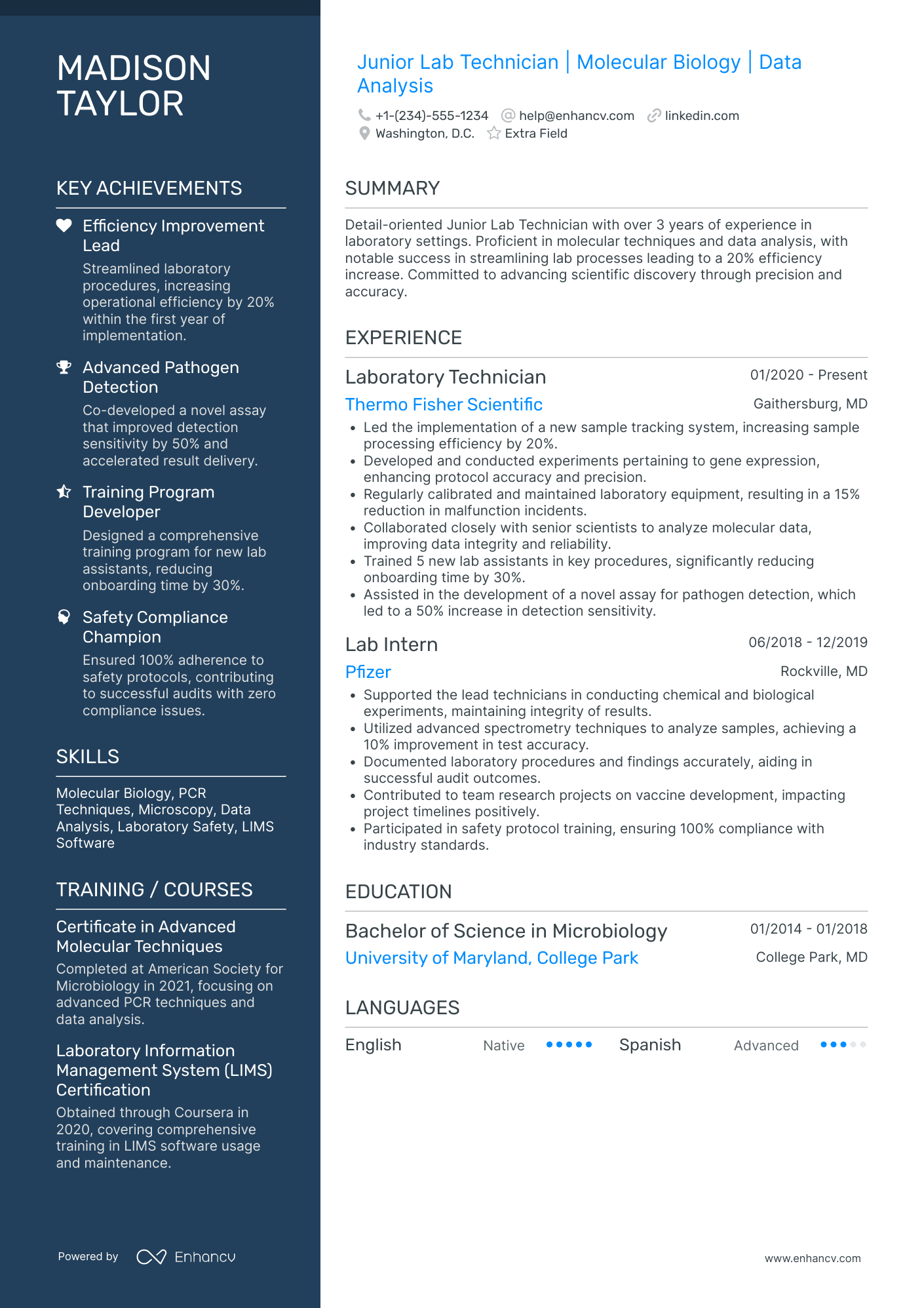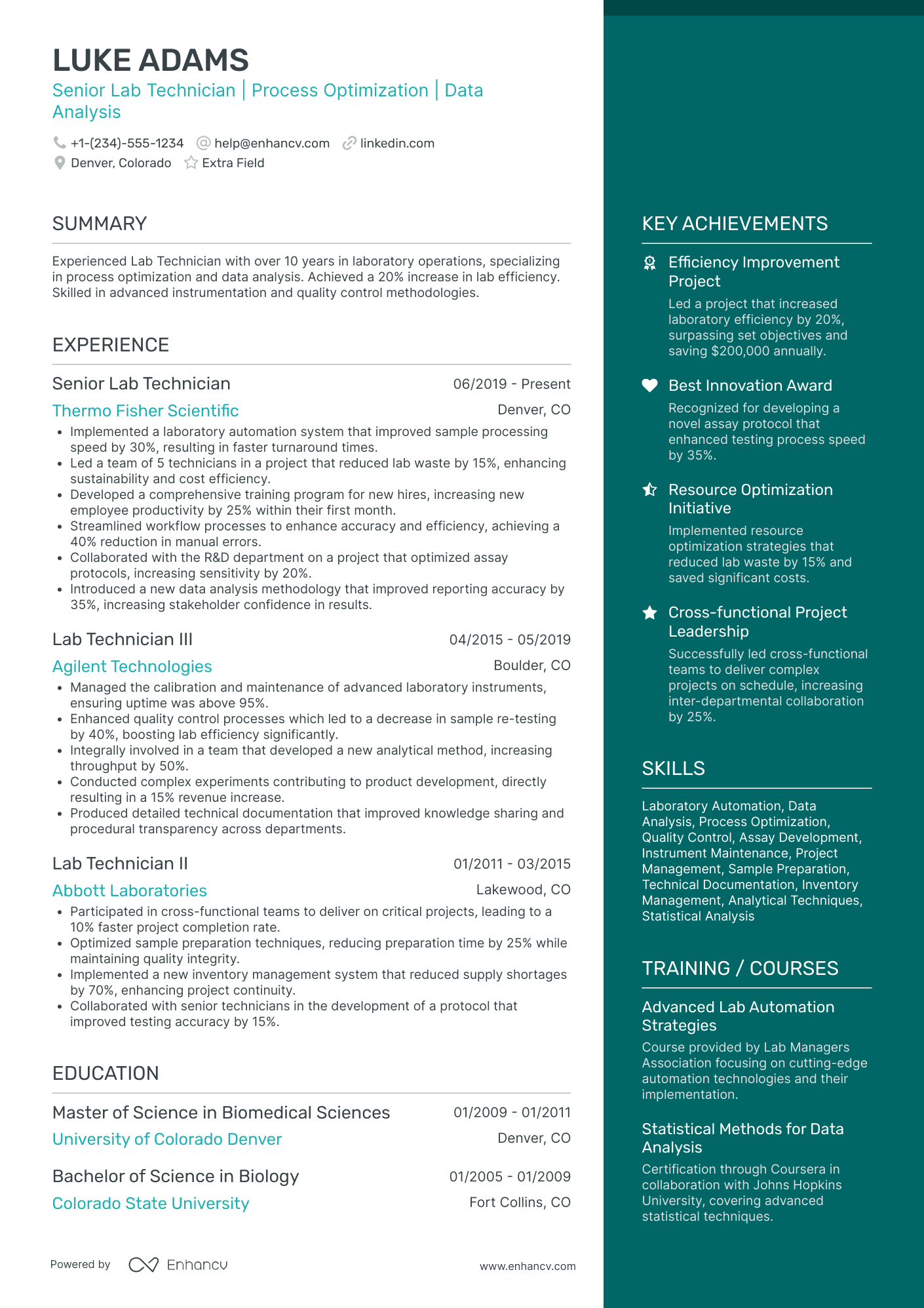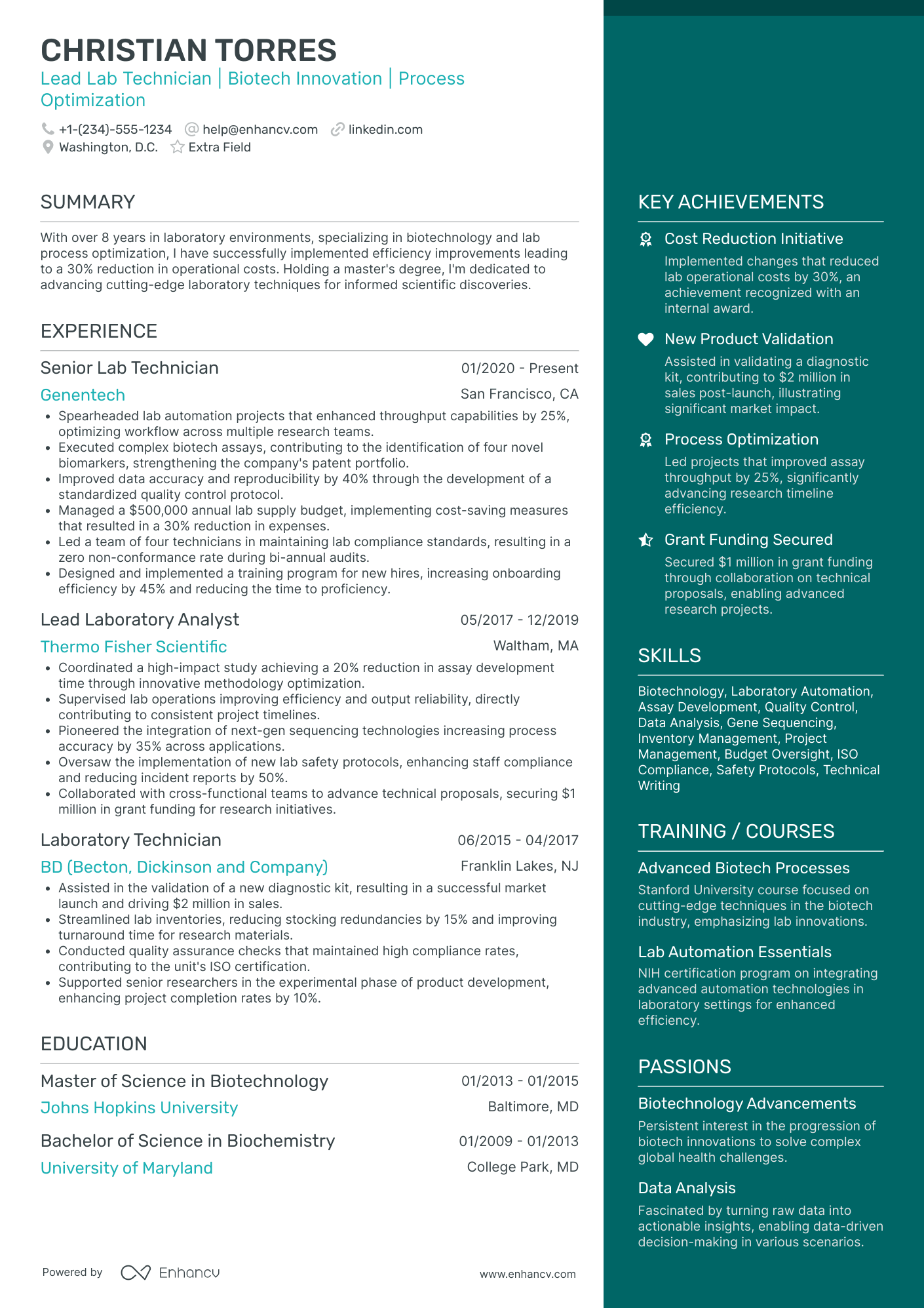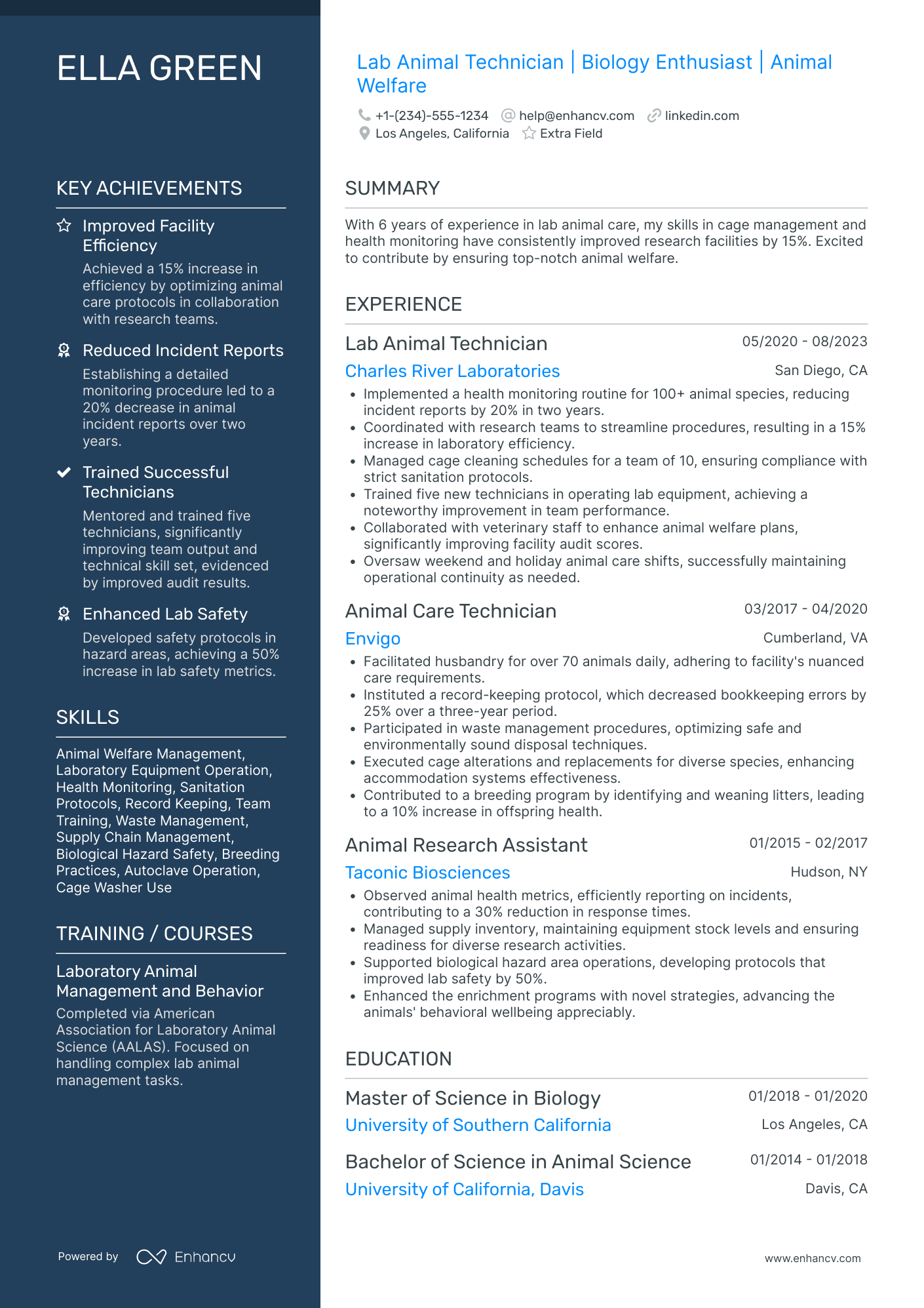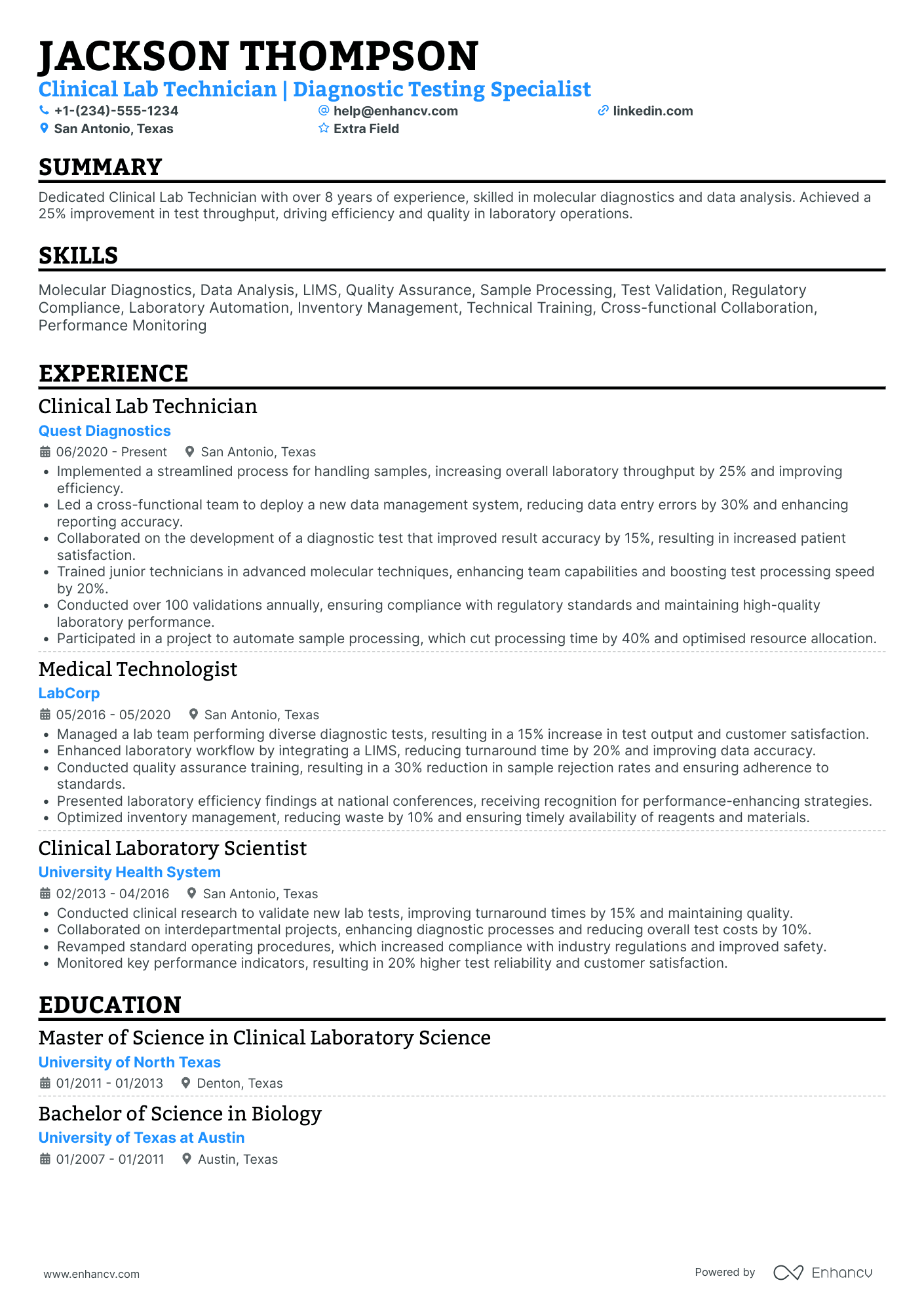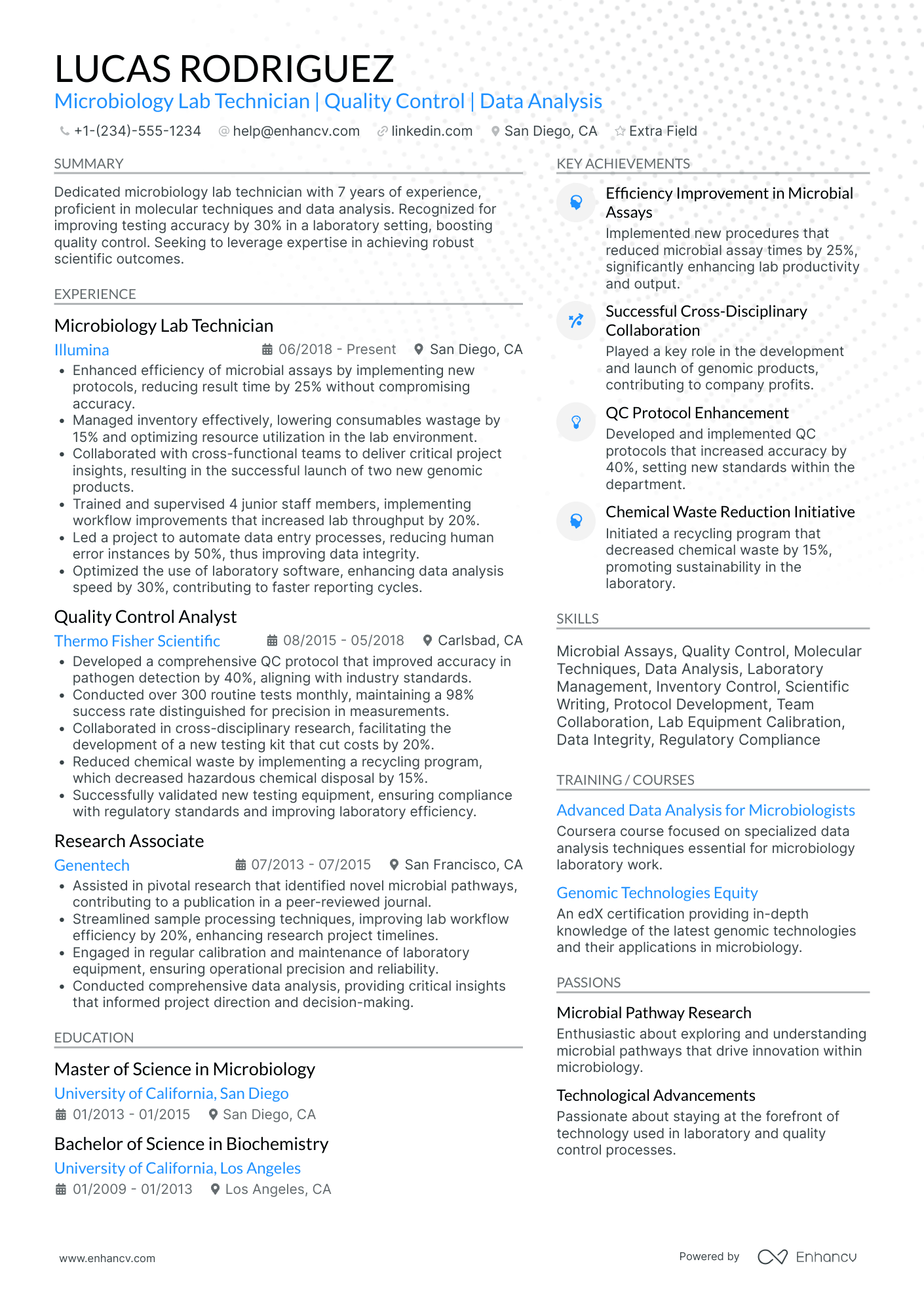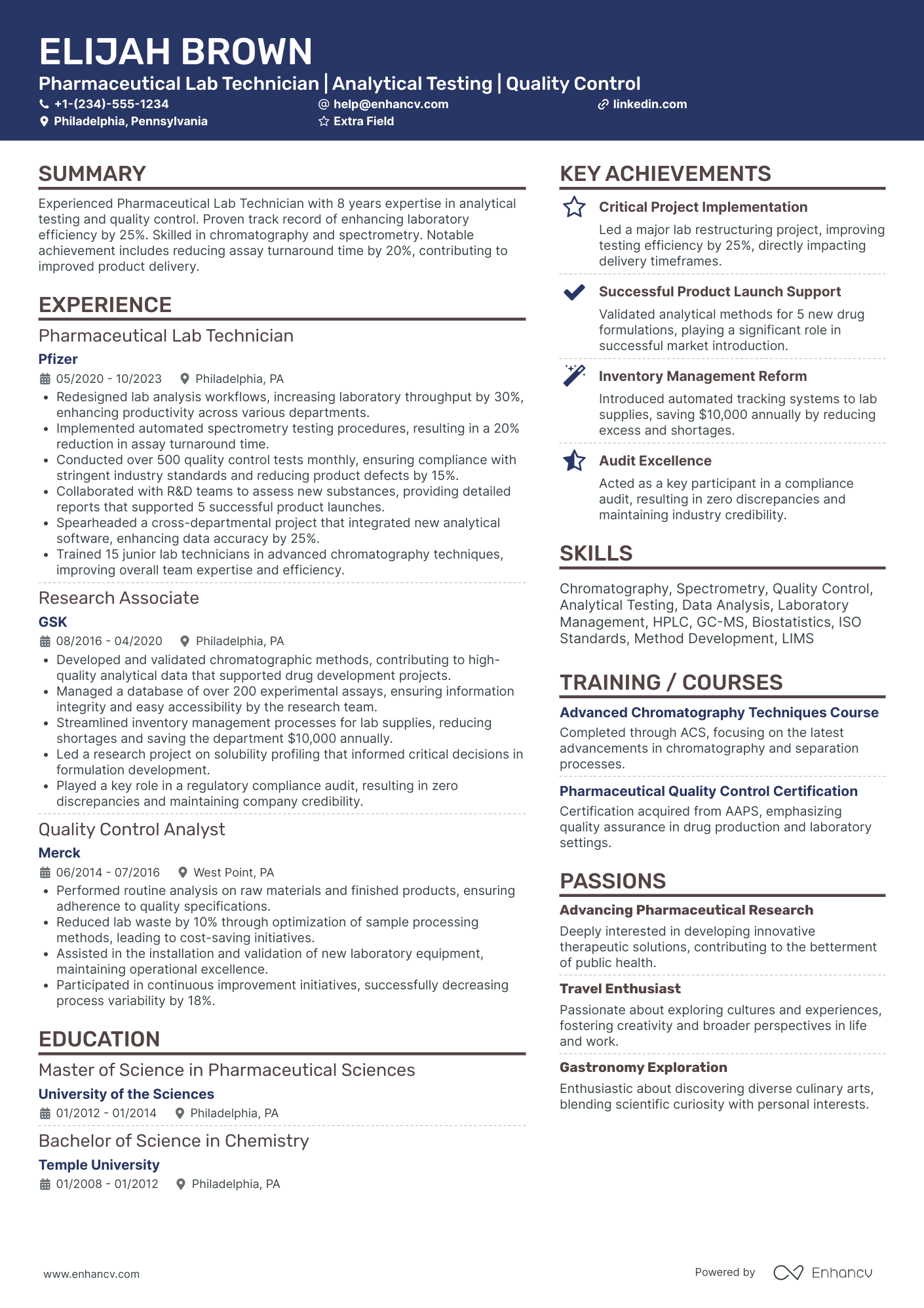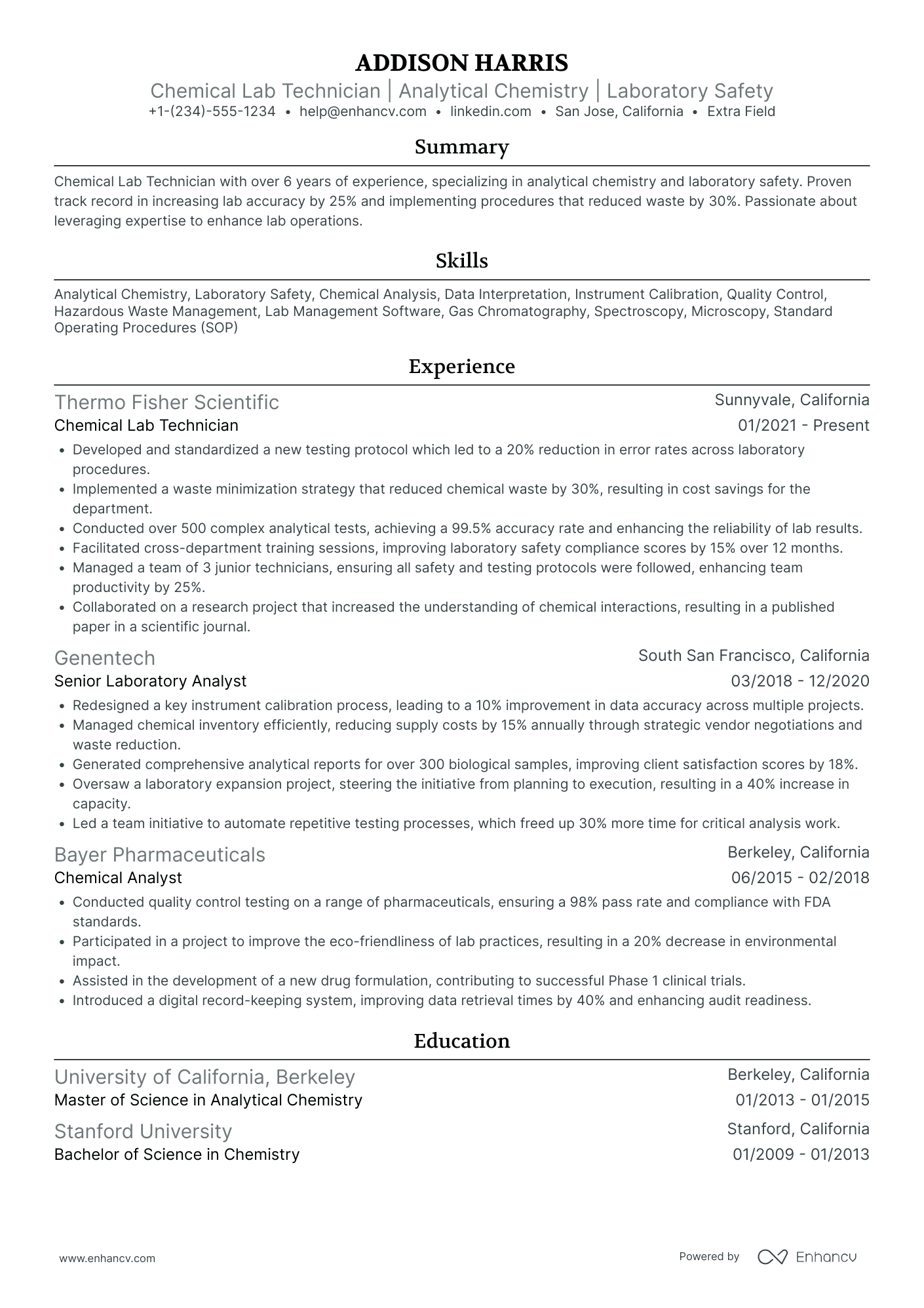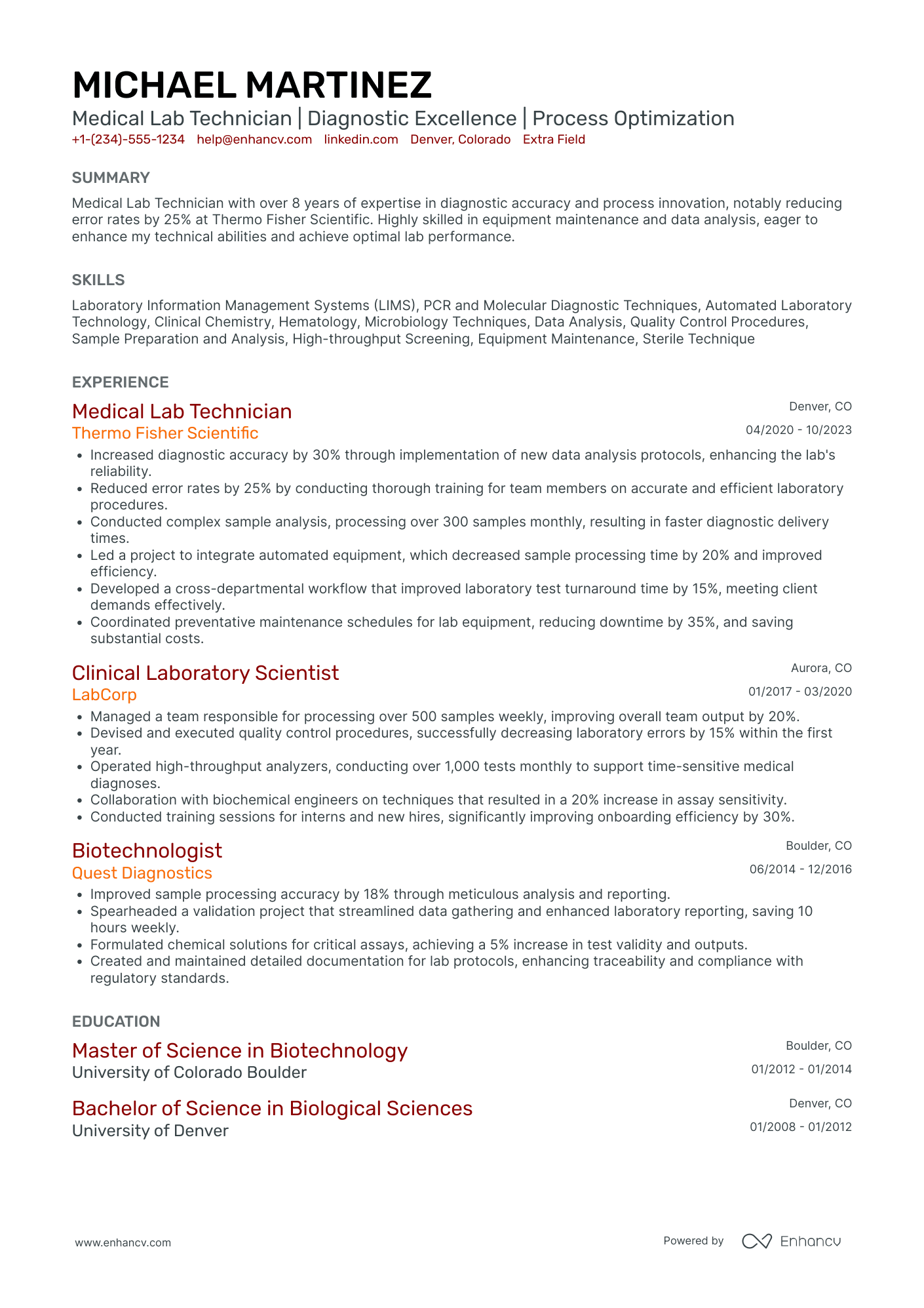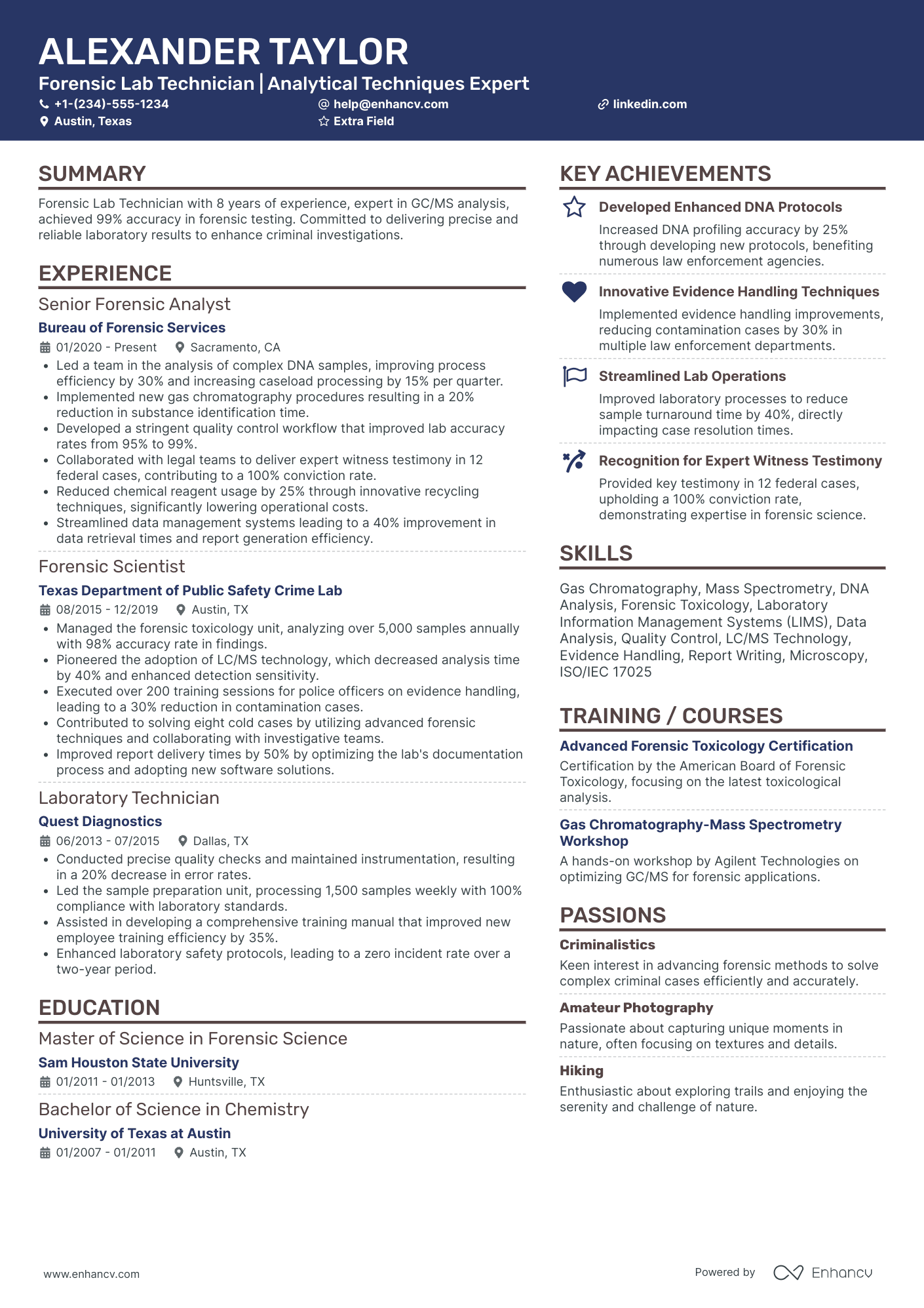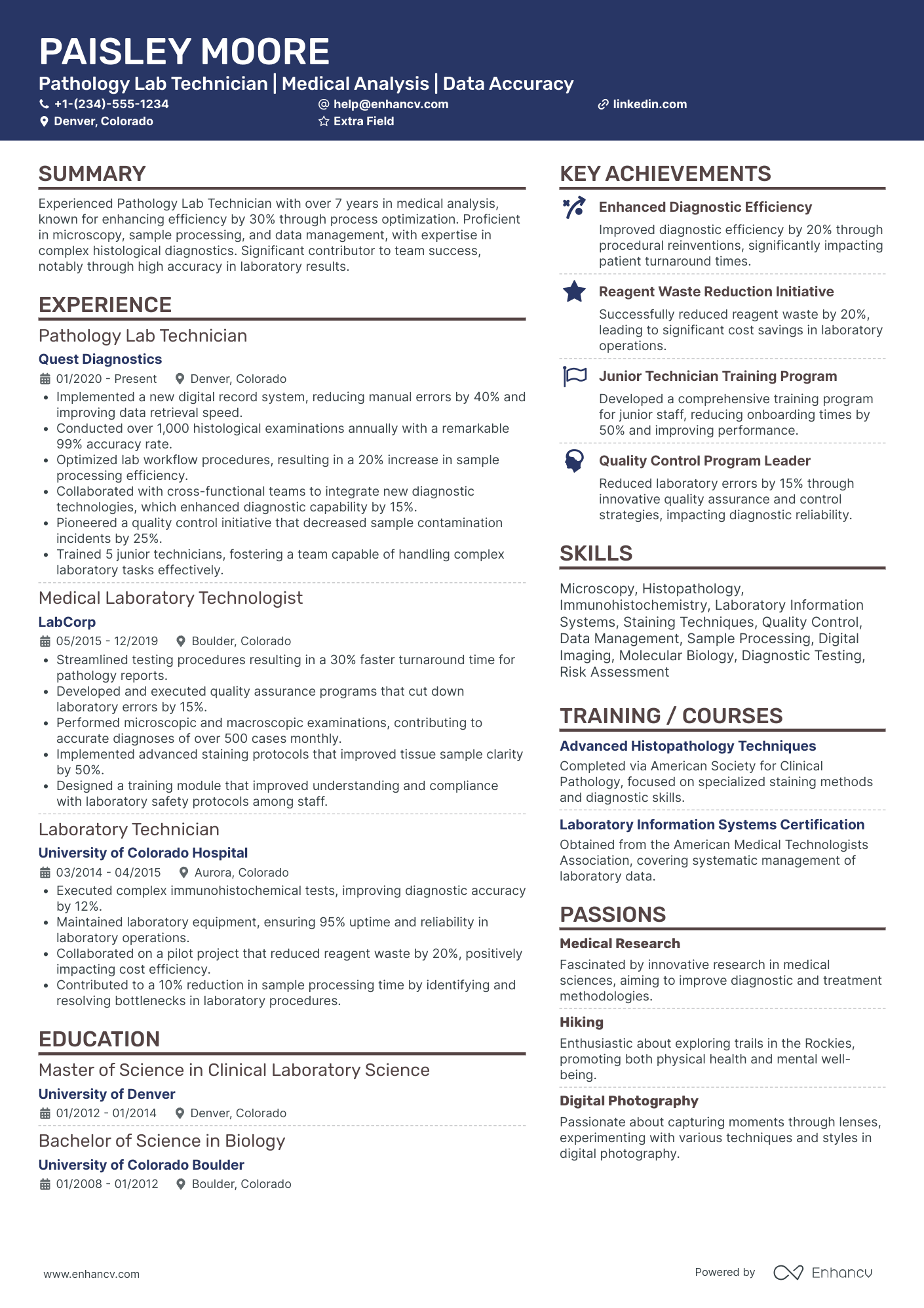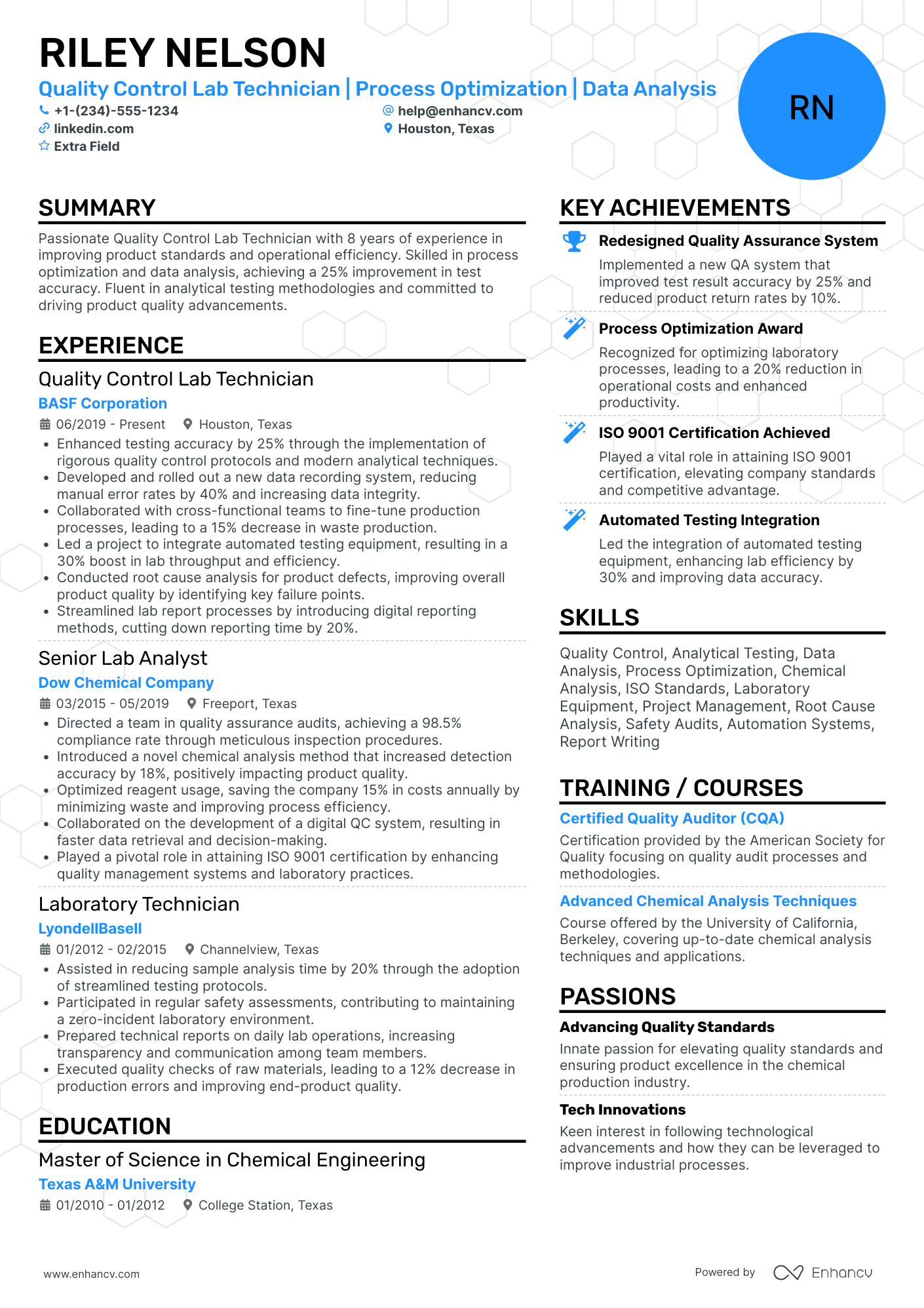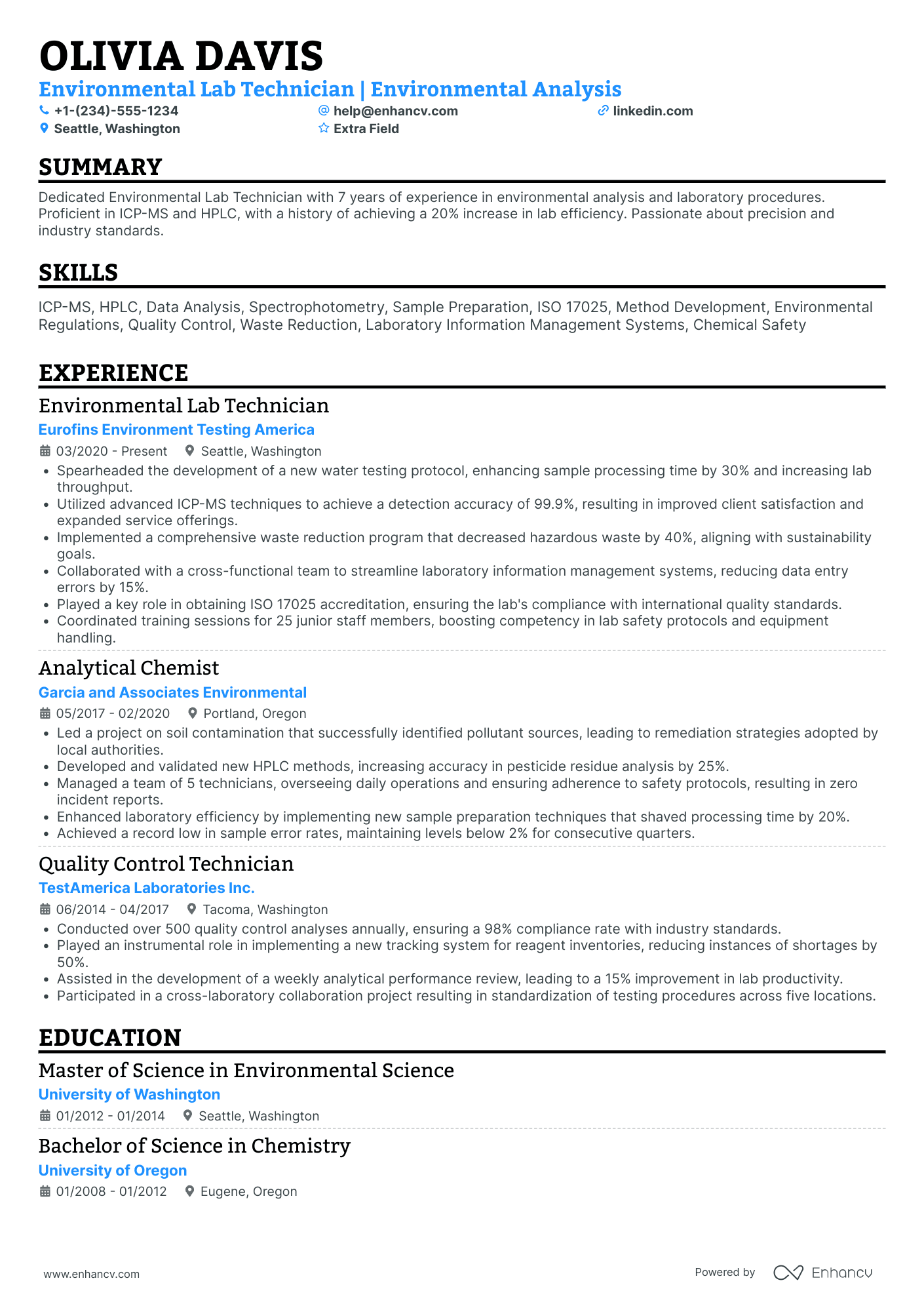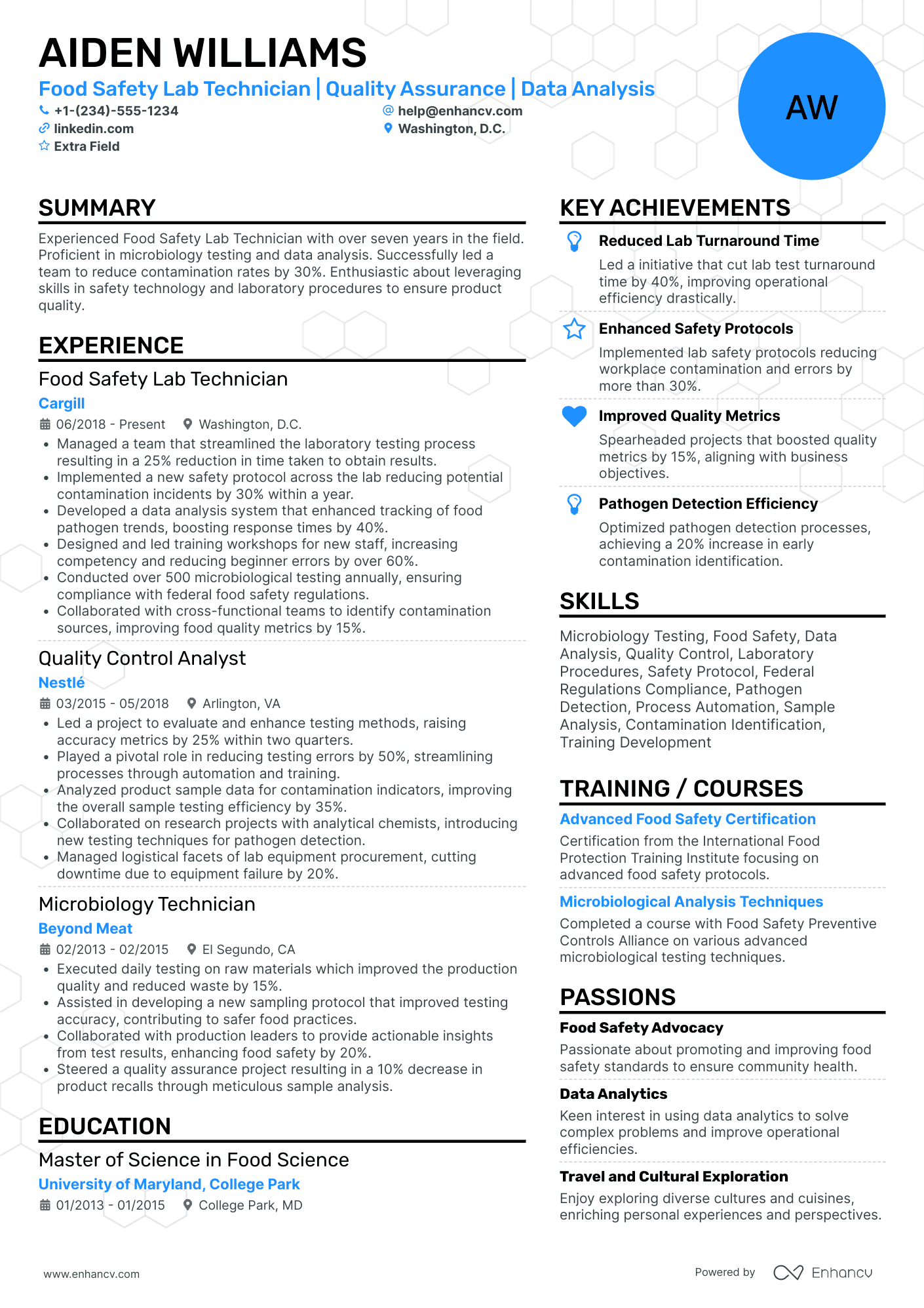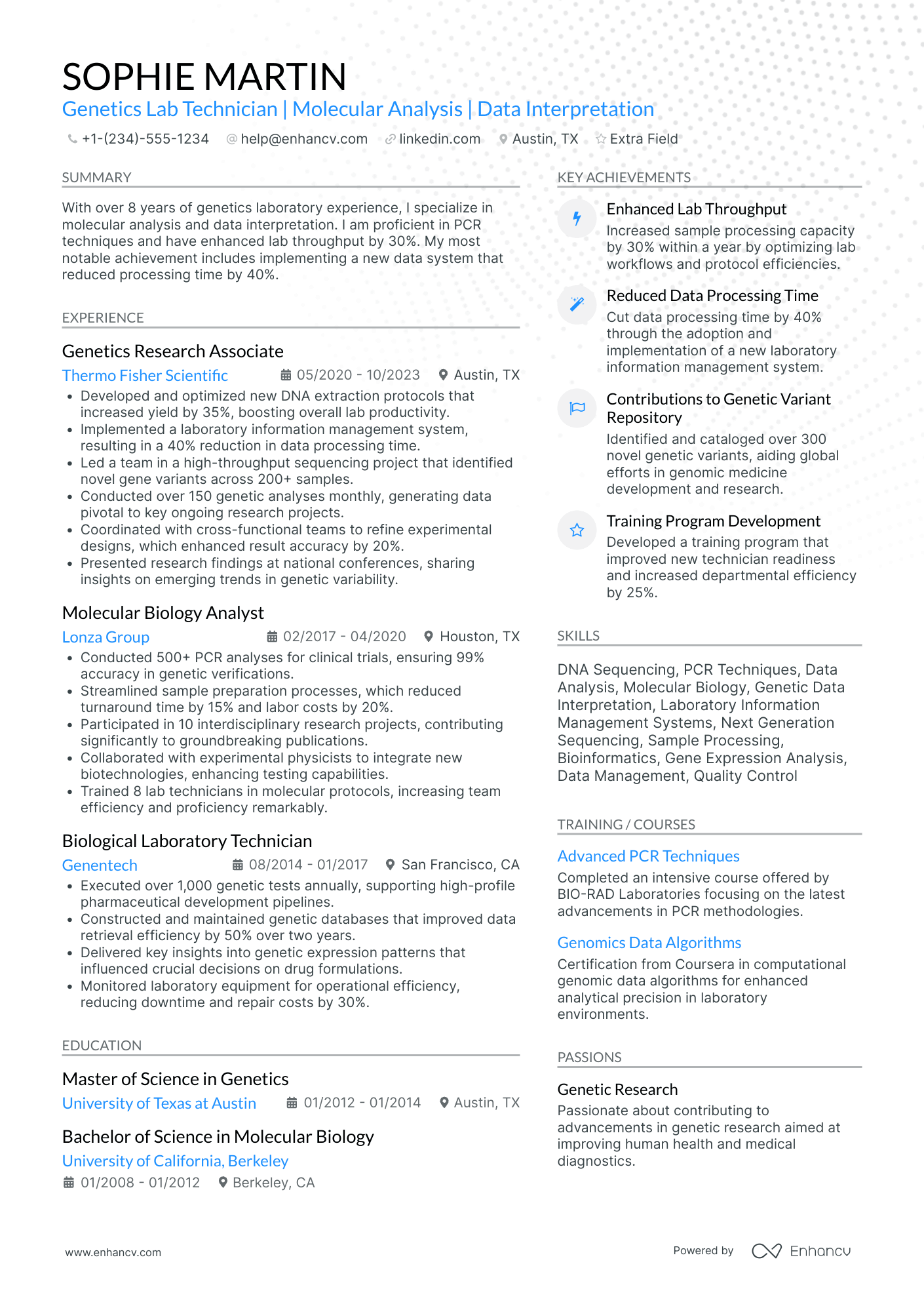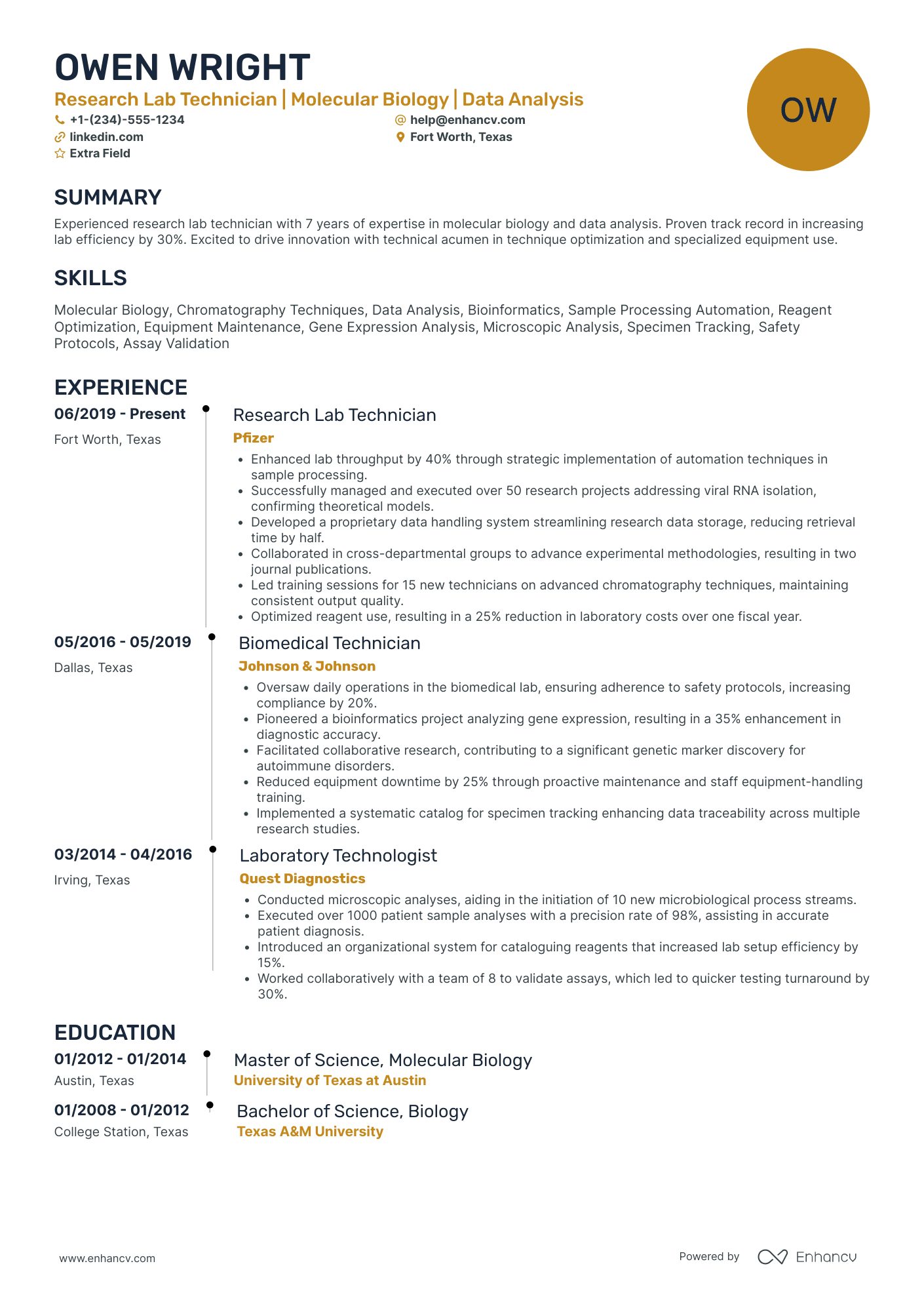As a lab technician, articulating the diverse range of skills you've mastered—from precise laboratory procedures to complex data analysis—can be a daunting resume challenge. Our guide offers tailored strategies to highlight your technical expertise and practical experiences, ensuring your resume distinctively showcases your qualifications to potential employers.
- Apply best practices from professional resumes to spotlight your application;
- Quantify your professional experience with achievements, career highlights, projects, and more;
- Write an eye-catching lab technician resume top one-third with your header, summary/objective, and skills section;
- Fill in the gaps of your experience with extracurricular, education, and more vital resume sections.
We've selected, especially for you, some of our most relevant lab technician resume guides. Getting you from thinking about your next career move to landing your dream job.
- Research Manager Resume Example
- Lab Assistant Resume Example
- Lab Manager Resume Example
- Scientist Resume Example
- Research Associate Resume Example
- Researcher Resume Example
- Radiologic Technologist Resume Example
- Research Director Resume Example
- Research Assistant Resume Example
- Chemist Resume Example
The Importance of Format and Layout in Your Lab Technician Resume
Consider you're an HR professional at company X, evaluating two lab technician candidate resumes. John Smith presents a simple, traditional, and easy-to-read resume. Edward Price, however, uses a non-conventional, often illegible format. Whose resume would you spend more time on to understand their experience? This scenario underscores the importance of your lab technician resume’s design. It should be simply formatted and clearly communicate why you are the ideal candidate for the role.
Achieve this balance by:
- Listing your experience, beginning with the most recent and relevant, in reverse chronological order;
- Ensuring your header contains essential information, such as contact details, a headline, and a portfolio link. Include a professional photo in the lab technician resume header if you have one;
- Including only the most important and relevant resume sections to showcase your expertise and stand out from other candidates;
- Editing your lab technician resume to be no longer than two pages if you have extensive relevant experience. Use your limited resume space judiciously.
Also, remember that your lab technician resume might initially be scanned by an Applicant Tracker System (ATS).
When it comes to ATS:
- Opt for simple and legible fonts like Raleway, Rubik, Lato, etc., making your experience easy for the ATS to scan;
- Use serif and sans-serif fonts, both of which are ATS-friendly;
- Avoid overused options like Arial and Times New Roman, which, while suitable, may lack personality.
Contrary to a common myth, our recent study shows that the ATS can effectively process both one-column and two-column resumes. Learn more about this in the ATS myths guide.
Finally, when submitting your lab technician resume, always export it as a PDF to ensure all information remains intact, making the document easier to print, read, and scan.
Customize your resume for the market – a Canadian format, for example, might vary in structure.
Upload & Check Your Resume
Drop your resume here or choose a file. PDF & DOCX only. Max 2MB file size.
PRO TIP
The more trusted the organization you've attained your certificate (or degree) from, the more credible your skill set would be.
Don't forget to include these six sections on your lab technician resume:
- Header and summary for your contact details and to highlight your alignment with the lab technician job you're applying for
- Experience section to get into specific technologies you're apt at using and personal skills to deliver successful results
- Skills section to further highlight how your profile matches the job requirements
- Education section to provide your academic background
- Achievements to mention any career highlights that may be impressive, or that you might have missed so far in other resume sections
What recruiters want to see on your resume:
- Experience with relevant laboratory techniques and equipment.
- Knowledge of laboratory safety procedures and compliance with standards.
- Ability to process and analyze specimens accurately and efficiently.
- Proficiency in data recording and the use of laboratory information systems.
- Strong attention to detail for quality control and troubleshooting experiments.
Advice for Your Lab Technician Resume Experience Section - Setting Your Application Apart From Other Candidates
Your resume experience section needs to balance your tangible workplace achievements with job requirements.
The easiest way to sustain this balance between meeting candidate expectations, while standing out, is to:
- Select really impressive career highlights to detail under each experience and support those with your skills;
- Assess the job advert to define both the basic requirements (which you could answer with more junior roles) and the more advanced requirements - which could play a more prominent role through your experience section;
- Create a separate experience section, if you decide on listing irrelevant experience items. Always curate those via the people or technical skills you've attained that match the current job you're applying for;
- Don't list experience items from a decade ago - as they may no longer be relevant to the industry. That is, unless you're applying for a more senior role: where experience would go to demonstrate your character and ambitions;
- Define how your role has helped make the team, department, or company better. Support this with your skill set and the initial challenge you were able to solve.
Take a look at how real-life lab technician professionals have presented their resume experience section - always aiming to demonstrate their success.
- Executed over 30 high-precision analytical procedures per week to support Quality Assurance for pharmaceutical production, consistently maintaining a 98% accuracy rate.
- Managed the calibration and maintenance of chromatography systems, leading to a 20% increase in equipment uptime and reliability.
- Authored and reviewed lab reports that directly contributed to the successful FDA approval of 3 new drug applications.
- Streamlined biochemical assay development, which improved throughput by 35% while reducing operational costs by $15k annually.
- Supervised a team of 5 lab assistants, offering training and mentorship that helped reduce procedural errors by 25% over the course of a year.
- Collaborated on a multi-disciplinary project to identify and quantify novel biomarkers for early disease detection.
- Implemented a Lab Information Management System (LIMS), resulting in a 40% decrease in sample processing errors due to improved data management.
- Pioneered the adoption of automated liquid handling systems, which increased sample throughput by 50% and reduced repetitive strain injuries in lab personnel.
- Contributed to a cross-functional research team by providing essential data analysis that facilitated the launch of a successful $2 million neuroscience research initiative.
- Conducted over 500 microbial contamination tests per month for food safety, playing a pivotal role in maintaining a 99.9% product safety record for a large-scale food manufacturer.
- Led the reorganization of the sample storage system that improved laboratory efficiency and reduced sample retrieval times by 15%.
- Designed and led a successful initiative to attain ISO 17025 accreditation for the laboratory, enhancing the company's market competitiveness.
- Operated and maintained highly specialized mass spectrometry equipment, achieving a 5% increase in analysis precision through meticulous optimization of operating procedures.
- Trained 10 new lab technicians on proper laboratory safety and operational protocols, resulting in a record year with zero safety incidents.
- Played a key role in a research project that led to the development of a new laboratory technique patented by the company.
- Developed and validated new LC-MS/MS methods for toxicology screening, which expanded the lab's capabilities by 30% and attracted new contracts.
- Efficiently synthesized over 100 chemical compounds per month for a diverse range of research projects, with a 97% purity rate.
- Created a comprehensive lab safety manual adopted by the entire department, reducing hazardous incidents by over 40%.
- Oversaw and optimized a complex inventory system of laboratory reagents and supplies, cutting waste by 25% and saving the company $10k annually.
- Authored a quarterly report on lab operations that provided actionable insights, leading to a strategic overhaul in lab management practices.
- Piloted a new assay technique that was 20% faster than existing methods, significantly accelerating the R&D cycle for new products.
- Enhanced the material testing protocols for a high-tech polymers project, helping to reduce material defects by 22% in end products.
- Led the implementation of a continuous improvement program in the lab, which resulted in a 15% reduction in operational costs.
- Participated in a collaborative project with the R&D department that yielded two patents in the area of sustainable material processing.
The following content includes information from "O*NET OnLine" by the U.S. Department of Labor, Employment and Training Administration (USDOL/ETA). Used under the CC BY 4.0 license. The data represents the top responsibilities present on the task lists for lab technician professionals.
Top Responsibilities for Lab Technician:
- Drill and tap holes for rivets, and glue, weld, bolt, or rivet parts together to form prosthetic or orthotic devices.
- Read prescriptions or specifications to determine the type of product or device to be fabricated and the materials and tools required.
- Make orthotic or prosthetic devices, using materials such as thermoplastic and thermosetting materials, metal alloys and leather, and hand or power tools.
- Bend, form, and shape fabric or material to conform to prescribed contours of structural components.
- Construct or receive casts or impressions of patients' torsos or limbs for use as cutting and fabrication patterns.
- Repair, modify, or maintain medical supportive devices, such as artificial limbs, braces, or surgical supports, according to specifications.
- Cover or pad metal or plastic structures or devices, using coverings such as rubber, leather, felt, plastic, or fiberglass.
- Test medical supportive devices for proper alignment, movement, or biomechanical stability, using meters and alignment fixtures.
- Lay out and mark dimensions of parts, using templates and precision measuring instruments.
- Fit appliances onto patients, and make any necessary adjustments.
Quantifying impact on your resume
- Include the number of laboratory experiments conducted to show your hands-on experience and efficiency.
- Specify the types of analytical techniques mastered and their frequency of use to demonstrate technical proficiency.
- Detail the percentage of time saved on projects through process improvements or innovation to highlight problem-solving skills.
- List the volumes of chemical reagents prepared or assays performed to illustrate workload management capabilities.
- Mention the accuracy rate of tests performed to emphasize reliability and attention to detail.
- Quantify the number of research projects supported to show teamwork and multi-tasking abilities.
- State the number of laboratory instruments calibrated and maintained to reinforce your responsibility in upkeeping lab resources.
- Describe any reduction in waste or cost savings achieved through inventory management or procedure optimization to underscore your contribution to operational efficiency.
Action verbs for your lab technician resume
No experience, no problem: writing your lab technician resume
You're quite set on the lab technician role of your dreams and think your application may add further value to your potential employers. Yet, you have no work experience . Here's how you can curate your resume to substitute your lack of experience:
- Don't list every single role you've had so far, but focus on ones that would align with the job you're applying for
- Include any valid experience in the field - whether it's at research or intern level
- Highlight the soft skills you'd bring about - those personality traits that have an added value to your application
- Focus on your education and certifications, if they make sense for the role.
Recommended reads:
PRO TIP
Showcase any ongoing or recent educational efforts to stay updated in your field.
Creating Your Lab Technician Resume Skills Section: Balancing Hard Skills and Soft Skills
Recruiters hiring for lab technician roles are always keen on hiring candidates with relevant technical and people talents. Hard skills or technical ones are quite beneficial for the industry - as they refer to your competency with particular software and technologies. Meanwhile, your soft (or people) skills are quite crucial to yours and the company's professional growth as they detail how you'd cooperate and interact in your potential environment. Here's how to describe your hard and soft skill set in your lab technician resume:
- Consider what the key job requirements are and list those towards the top of your skills section.
- Think of individual, specific skills that help you stand out amongst competitors, and detail how they've helped you succeed in the past.
- Look to the future of the industry and list all software/technologies which are forward-facing.
- Create a separate, technical skills section to supplement your experience and further align with the lab technician job advert. Find the perfect balance between your resume hard and soft skills with our two lists.
Top skills for your lab technician resume:
Microscopy
PCR (Polymerase Chain Reaction)
Spectrophotometry
Centrifugation
Chromatography
Electrophoresis
pH Meter Calibration
Autoclaving
Sample Preparation
Laboratory Information Management Systems (LIMS)
Attention to Detail
Problem-Solving
Communication
Time Management
Team Collaboration
Adaptability
Critical Thinking
Organizational Skills
Ethical Judgment
Safety Awareness
Next, you will find information on the top technologies for lab technician professonals from "O*NET OnLine" by the U.S. Department of Labor, Employment and Training Administration (USDOL/ETA). Used under the CC BY 4.0 license.
Top technologies for Lab Technician’s resume:
- Autodesk AutoCAD
- Ohio Willow Wood OMEGA Tracer System
- Footmaxx Metascan software
- Gait analysis software
- Microsoft Excel
PRO TIP
Bold the names of educational institutions and certifying bodies for emphasis.
Listing Your Education and Certifications on Your Lab Technician Resume
Don't underestimate the importance of your resume education section . As it may hint at various skills (and experience) that are relevant to the job. When writing your education section:
- Include only higher education degrees with information about the institution and start/end dates
- If you're in the process of obtaining your degree, include your expected graduation date
- Consider leaving off degrees that aren't relevant to the job or industry
- Write a description of your education if it presents you with an opportunity to further showcase your achievements in a more research-focused environment
When describing your certifications on your resume, always consider their relevancy to the role. Use the same format to describe them as you would for your education. If you're wondering what the best certificates out there are for lab technician roles, check out the list below.
The top 5 certifications for your lab technician resume:
- Certified Clinical Laboratory Technician (CLT) - American Society for Clinical Pathology (ASCP)
- Medical Laboratory Technician (MLT) - American Medical Technologists (AMT)
- Phlebotomy Technician (PBT) - National Healthcareer Association (NHA)
- Medical Lab Scientist (MLS) - American Society for Clinical Pathology (ASCP)
- Certified Biomedical Equipment Technician (CBET) - Association for the Advancement of Medical Instrumentation (AAMI)
The content below includes information from "O*NET OnLine" by the U.S. Department of Labor, Employment and Training Administration (USDOL/ETA). Used under the CC BY 4.0 license. The data represents the top associations for lab technician professionals.
Top US associations for a Lab Technician professional
- American Academy of Orthotists and Prosthetists
- American Board for Certification in Orthotics, Prosthetics and Pedorthics
- National Association of Dental Laboratories
- National Board for Certification in Dental Laboratory Technology
- National Commission on Orthotic and Prosthetic Education
PRO TIP
The more trusted the organization you've attained your certificate (or degree) from, the more credible your skill set would be.
Recommended reads:
Choosing Between a Lab Technician Resume Summary Or Objective
Many may argue that, in recent times, the lab technician resume summary or objective has become completely obsolete.
But the reality is different as both of these resume sections provide you with an opportunity to :
- integrate lab technician-vital keywords
- showcase your accomplishments
- answer why you're applying for this particular role.
The difference (between the summary and the objective) is that the:
- Resume objective puts your career goals in a more prominent position.
- Resume summary focuses more on career milestones.
We recommend you select the summary if you happen to have plenty of experience you'd like to spotlight from the very start of your lab technician resume.
Meanwhile, the objective is ideal for those candidates who'd like to further prove their suitability for the role with their goals and soft skills.
We've featured some industry professional lab technician resume samples to the best resume summary and objective structures:
Resume summaries for a lab technician job
- With a solid 8-year background in analytical chemistry and a proven track record in pharmaceutical quality control, the candidate brings to the table expertise in GC-MS analysis, a robust understanding of FDA regulations, and a notable achievement in reducing sample processing time by 30% through process optimization techniques.
- Keen to leverage a decade-long career in forensic science, this experienced lab technician excels at biological specimen analysis using advanced DNA sequencing tools, having played a central role in enhancing the crime detection rate by 25% within the state police's forensic department.
- Transitioning from a 5-year tenure in microbrewery quality assurance, this professional combines a passion for craft beer with a strong foundation in microbiological testing, eager to apply a unique perspective to food safety analysis by implementing innovative fermentation monitoring protocols.
- Seeking to transfer skills from a successful 6-year journey as an environmental consultant, the applicant comes equipped with a refined expertise in soil and water testing, adept at utilizing cutting-edge spectrometry techniques to assist in ecological conservation initiatives.
- Eager to embark on a laboratory technician career, this individual is poised to contribute a fresh and enthusiastic approach to scientific discovery. Dedicated to mastering technical instrumentation and committed to meticulous sample analysis, the objective is to develop into a proficient technician who contributes meaningfully to research outcomes.
- As a recent biology graduate with a fervent interest in medical research, the individual aspires to apply their academic knowledge and laboratory intern experience to a professional setting. The goal is to grow as a diagnostic expert while contributing to projects that push the boundaries of medical science and patient care.
Average Salary Info by State in the US for Lab Technician Professionals
Local salary info for Lab Technician.” Source: My Next Move, National Center for O*NET Development. Accessed 10/15/2024
| State | Average Salary (in USD) |
|---|---|
| US National Average | $44,960 |
| California (CA) | $46,370 |
| Texas (TX) | $40,510 |
| Florida (FL) | $42,590 |
| New York (NY) | $48,160 |
| Pennsylvania (PA) | $44,320 |
| Illinois (IL) | $37,940 |
| Ohio (OH) | $46,030 |
| Georgia (GA) | $51,950 |
| North Carolina (NC) | $44,650 |
| Michigan (MI) | $48,110 |
Taking Your Lab Technician Resume to the Next Level with These Four Additional Resume Sections
Your lab technician resume can feature a variety of skills (both hard and soft) in diverse sections. Choose those that align best with the job requirements and reflect your suitability for the company culture.
Consider these four additional resume sections recommended by our experts:
- Languages - State any languages you are proficient in and your level of proficiency. This demonstrates your commitment to communication and potential for international growth.
- Projects - Highlight up to three significant projects you've completed outside of work, showcasing skill development. Include a link to your project portfolio in the lab technician resume header, if applicable.
- My Time - How you allocate your time outside work can indicate your organizational skills and cultural fit within the company.
- Volunteering - Detail causes you're passionate about, roles you've held, and achievements in volunteering. Such experiences likely have honed a range of soft skills crucial for your dream job.
Key Takeaways
- Your resume layout plays an important role in presenting your key information in a systematic, strategic manner;
- Use all key resume sections (summary or objective; experience; skills; education and certification) to ensure you’ve shown to recruiters just how your expertise aligns with the role and why you're the best candidate;
- Be specific about listing a particular skill or responsibility you've had by detailing how this has helped the role or organization grow;
- Your personality should shine through your resume via the interests or hobbies, and strengths or accomplishments skills sections;
- Certifications go to provide further accreditation to your technical capabilities, so make sure you've included them within your resume.
Lab Technician resume examples
By Experience
Junior Lab Technician
Senior Lab Technician
Lead Lab Technician
By Role
